#enterprise cloud solutions
Explore tagged Tumblr posts
Text

Explore the top 10 best practices to ensure scalability in cloud computing with eShare.ai. From choosing the right architecture and load balancing strategies to monitoring usage and automating deployments, these principles help businesses maximize performance, reduce downtime, and scale seamlessly. Perfect for startups and enterprises aiming for efficiency in a digital-first world.
#cloud scalability#cloud computing best practices#eShare.ai#scalable cloud infrastructure#SaaS optimization#business cloud strategy#scalable architecture#load balancing cloud#cloud automation#IT infrastructure#performance monitoring#enterprise cloud solutions
0 notes
Text
0 notes
Text
Discover how to build a successful cloud strategy in 2025 with expert tips, key steps, and best practices. Learn how to align your cloud adoption with business goals, reduce costs, and boost performance.
#cloud strategy 2025#successful cloud adoption#cloud migration plan#building cloud strategy#enterprise cloud solutions#cloud best practices 2025#cloud transformation tips#cloud computing roadmap#cloud cost optimization#business cloud strategy
0 notes
Text
How Cloud Migration Services are Reshaping Business Operations
Cloud Migration Services Market: Trends, Growth, and Forecast
The Cloud Migration Services Market is witnessing significant growth as businesses increasingly adopt cloud-based solutions to enhance efficiency, scalability, and cost-effectiveness. As organizations strive to modernize their IT infrastructure, the demand for seamless and secure cloud migration services continues to rise.
Request Sample PDF Copy:https://wemarketresearch.com/reports/request-free-sample-pdf/cloud-migration-services-market/996
Cloud Migration Services Market Size and Share
The Cloud Migration Services Market Size is expanding rapidly, driven by the increasing need for enterprises to move their workloads, applications, and data to the cloud. The market is segmented based on service types, deployment models, enterprise sizes, and industries. With the growing adoption of hybrid and multi-cloud strategies, the Cloud Migration Services Market Share is being distributed across major cloud service providers such as AWS, Microsoft Azure, and Google Cloud Platform.
Cloud Migration Services Market Growth and Trends
The Cloud Migration Services Market Growth is fueled by various factors, including digital transformation initiatives, cost savings, improved security measures, and enhanced operational efficiency. Enterprises are leveraging AI and automation in cloud migration processes, further accelerating adoption rates. Among the key Cloud Migration Services Market Trends, hybrid and multi-cloud deployments are gaining momentum as businesses seek flexibility and risk mitigation strategies.
Key Drivers of Market Growth
Several factors are propelling the growth of the cloud migration services market:
Adoption of Hybrid Cloud Solutions: Organizations are increasingly implementing hybrid cloud strategies to optimize workloads, enhance data management, and reduce operational costs.
Need for Business Agility: The demand for rapid and streamlined application deployment through pay-as-you-go models has made cloud migration services essential for modern business strategies.
Implementation of Automation Solutions: The growing adoption of automation tools in cloud migration processes reduces manual intervention, accelerates time-to-value, and ensures compliance.
Market Segmentation
The cloud migration services market can be segmented based on service type, deployment model, organization size, application, and vertical:
Service Type: Includes automation, integration, disaster recovery, application hosting and monitoring, DevOps, training and consulting, support and maintenance.
Deployment Model: Comprises public, private, and hybrid clouds.
Organization Size: Caters to both large enterprises and small and medium-sized enterprises (SMEs).
Application: Encompasses project management, infrastructure management, security and compliance management, among others.
Verticals: Serves various sectors such as banking, financial services, and insurance (BFSI), healthcare and life sciences, telecommunications and ITES, manufacturing, retail, and entertainment.
Cloud Migration Services Market Price and Potential
The Cloud Migration Services Market Price varies based on factors such as migration complexity, the volume of data, customization requirements, and additional security features. Enterprises are investing in cloud migration services to reduce operational expenses and improve system performance. The Cloud Migration Services Market Potential remains vast, with small and medium-sized enterprises (SMEs) increasingly adopting cloud migration strategies to compete with larger enterprises.
Cloud Migration Services Market Forecast and Analysis
The Cloud Migration Services Market Forecast suggests continued expansion, with a projected compound annual growth rate (CAGR) in the coming years. The market's upward trajectory is supported by increased cloud adoption across industries, advancements in cloud technologies, and the rising need for remote work solutions. A comprehensive Cloud Migration Services Market Analysis indicates that North America and Europe hold a dominant position, while the Asia-Pacific region is emerging as a key growth market due to rapid digitization efforts.
Competitive Landscape
The cloud migration services market is characterized by the presence of major players such as Accenture PLC, IBM Corporation, Amazon Web Services Inc., Cisco Systems Inc., and Microsoft Corporation.
These companies are continually innovating and expanding their service offerings to cater to the evolving needs of businesses undergoing cloud transformation.
Future Outlook
The cloud migration services market is poised for continued growth, driven by technological advancements, increasing adoption of hybrid and multi-cloud strategies, and the rising need for business agility and automation. As organizations continue to prioritize digital transformation, the demand for efficient and secure cloud migration services is expected to escalate, offering significant opportunities for service providers in this dynamic market.
Regional Insights
North America holds a significant share of the cloud migration services market, attributed to its advanced technological infrastructure and mature IT landscape. The region's businesses leverage cloud solutions to gain enhanced flexibility, scalability, cost efficiency, and business continuity.
Other regions, including Europe and Asia-Pacific, are also witnessing substantial growth due to increasing digital transformation initiatives and cloud adoption.
Related Report:
Fraud Detection and Prevention Market:
https://wemarketresearch.com/reports/fraud-detection-and-prevention-market/1114
Video Conferencing Market:
https://wemarketresearch.com/reports/video-conferencing-market/929
Conclusion
The Cloud Migration Services Market is poised for substantial growth as businesses increasingly rely on cloud-based solutions. With evolving Cloud Migration Services Market Trends, enterprises are embracing hybrid and multi-cloud approaches, automation, and AI-driven migration tools. As the demand for cloud migration services rises, organizations must stay informed about Cloud Migration Services Market Analysis and forecasts to make strategic decisions that align with their digital transformation goals.
#Cloud Migration#Cloud Computing#Cloud Services#Cloud Transformation#Cloud Adoption#Digital Transformation#Cloud Infrastructure#Cloud Strategy#IT Modernization#Enterprise Cloud Solutions#Hybrid Cloud#Public Cloud#Private Cloud#Multi-Cloud#Cloud Security#Cloud Cost Optimization#Cloud Service Providers#Cloud Migration Tools#Cloud Integration#Data Migration#Cloud Scalability
0 notes
Text
Top 5 data management mistakes costing UAE businesses millions
Introduction
In an increasingly digital economy, poor data practices have become more than just an IT issue—they are an enterprise-level risk.

Across the UAE, businesses are losing millions annually due to fragmented systems, inconsistent governance, and reactive strategies.
In this article, we’ll unpack five critical data managementmistakes, their tangible costs, and what forward-thinking firms are doing to stay compliant, competitive, and data-resilient in 2025.
1. Fragmented Data Silos Across Departments
While decentralization may speed up local decision-making, it often comes at the cost of data cohesion. Sales, marketing, finance, and operations frequently maintain isolated datasets that never sync—each with its own metrics, definitions, and reporting cycles. The cost? Missed opportunities, duplicated efforts, inconsistent KPIs, and customer insights that are either delayed or distorted due to incompatible sources. Fix: Implement centralized data lakes or unified ERP/CRM systems to bridge these silos. Introduce cross-departmental governance protocols, and enforce scheduled data synchronization to maintain consistency across all business functions.
2. Weak Data Governance and Access Controls
Many UAE businesses still lack formal governance policies. There’s little clarity on who owns the data, who can access it, and how data quality is maintained across systems and touchpoints. The cost? Increased risk of data breaches, GDPR/DIFC non-compliance, unauthorized exposure of sensitive information, and eroded stakeholder trust—especially in sectors like healthcare, finance, and public services. Fix: Deploy a robust data governance framework with clearly defined roles, role-based access controls, automated audit trails, and regular compliance reviews. Embed accountability at every stage of data creation and usage.
3. Overreliance on Legacy Infrastructure
Outdated database architectures, manual Excel trackers, and siloed on-prem systems continue to dominate back-end processes—despite widespread digital front-ends. The cost? Performance bottlenecks during scale, limited real-time data visibility, high IT maintenance overheads, and an inability to integrate with modern analytics or automation tools. Fix: Migrate to cloud-native platforms that support elastic scaling, system redundancy, and embedded analytics. Incorporate APIs for seamless integration with existing digital tools while phasing out legacy dependencies.
4. Lack of Data Quality Assurance
Inconsistent formats, missing fields, outdated records, and duplicated entries remain common issues across enterprise datasets—especially when multiple input sources aren’t standardized.
The cost?
Flawed business reports, poor AI/ML model performance, customer experience setbacks, and incorrect decision-making based on unreliable data.
Fix:
Introduce end-to-end data quality frameworks that include automated validation checks, enrichment protocols, and AI-driven anomaly detection.
Regular audits and cleansing routines should be part of standard operations.
5. Treating Data Strategy as a One-Off Project
Many businesses initiate data initiatives as one-time efforts—an implementation followed by months (or years) of stagnation.
Without ongoing refinement, systems become outdated, and processes lose alignment with evolving business needs.
The cost?
Strategic misalignment, increasing technical debt, and declining ROI on digital investments that fail to evolve with the organization’s goals.
Fix:
Create a living data strategy—an adaptive roadmap reviewed quarterly, driven by key stakeholders across departments.
Tie progress to measurable KPIs like operational efficiency, customer satisfaction, or revenue growth from data-led initiatives.
Turn Costly Data Chaos into Smart Business Decisions: Nordstar Vision
At Nordstar Vision, we help businesses move from fragmented systems to future-ready data ecosystems.
Whether you’re struggling with outdated infrastructure, data silos, or lack of governance, our team brings tailored solutions to help you scale confidently in a data-first economy.
Let’s turn your data into a growth engine.
Reach out to us today at +(971) 50 1108756 or visit nordstartvision.
#data management UAE#business data mistakes#UAE data strategy#data governance UAE#database management Dubai#digital transformation UAE#legacy system issues#cloud migration UAE#data silos#enterprise data solutions#data compliance UAE#Nordstar Vision#data quality assurance#CRM data issues#ERP data integration#UAE business IT risks#data-driven decisions#business analytics UAE#smart data practices
2 notes
·
View notes
Text
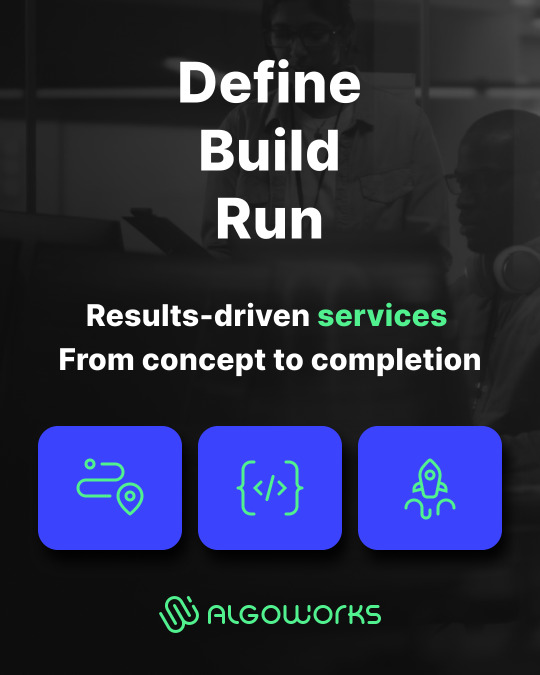
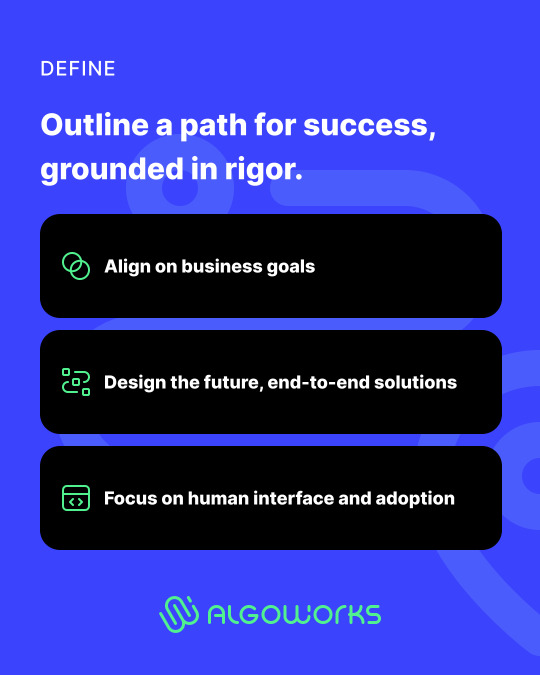

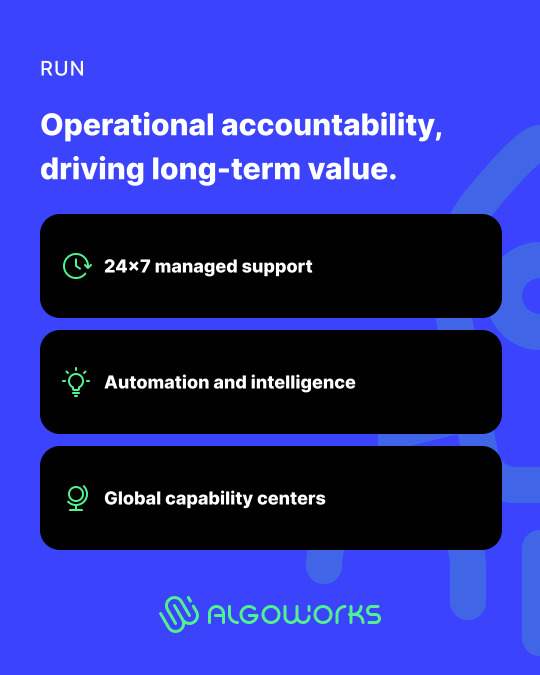

We follow our Define, Build, Run framework to execute flawlessly. From deep listening and 360° planning, to building with agile development and clean code, we ensure performance, security and return on investment through 24/7 monitoring and SLA-backed delivery.
Visit our website to learn more! https://www.algoworks.com/services/
#digital transformation#agile development#clean code#software engineering#cyber security#enterprise solutions#tech innovation#cloud services#innovations#technology#leadership#business excellence
2 notes
·
View notes
Text

🚀 Your Workflow Deserves an Upgrade! 🚀 Ready to take your business to the next level? 💼✨ Get our FREE ERP DEMO and see the results for yourself! 🌟
#magtec#erp#automation#business#efficiency#software#technology#innovation#digitaltransformation#enterprise#solutions#productivity#success#growth#management#finance#humanresources#supplychain#logistics#cloud#saas#onpremises#hybrid#integration#scalability#customization#support#trustedpartner#magtecerp#magtecsolutions
4 notes
·
View notes
Text
At AQe Digital, we leverage cutting-edge technologies and our 27+ years of extensive experience to deliver goal-oriented digital solutions tailored to industry-specific needs.
✅ 650+ highly skilled professionals driving innovation and excellence.
✅ Industry-focused solutions designed for maximum impact.
✅ Quick collaboration, agile development, and reliable support for seamless execution.
#Digital Product Engineering#Digital Transformation#Enterprise Solutions#Next-gen Tech#Cloud-based ERP solutions#Custom Product Development#Online Retail Solutions#Apps & Integrations
2 notes
·
View notes
Text

1 note
·
View note
Text
What is the best web-based enterprise accounting software?
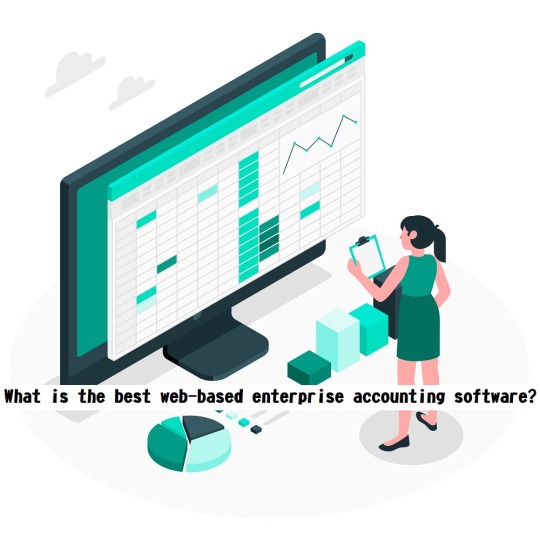
In the fast-paced and ever-evolving landscape of business, staying on top of your finances is crucial. As enterprises expand their operations, managing accounts efficiently becomes a daunting task. Thankfully, with the advent of technology, businesses now have access to a plethora of web-based enterprise accounting software options to streamline their financial processes. In this comprehensive guide, we will explore the ins and outs of web-based enterprise accounting software, helping you make an informed decision on the best solution for your business needs.
Understanding Web-Based Enterprise Accounting Software
Web-based enterprise accounting software, often referred to as cloud accounting software, is a digital solution that allows businesses to manage their financial activities online. Unlike traditional accounting systems that rely on on-premise software, web-based accounting tools operate in the cloud, offering users the flexibility to access their financial data from anywhere with an internet connection.
Advantages of Web-Based Enterprise Accounting Software
1. Accessibility
One of the primary advantages of web-based accounting software is accessibility. With data stored securely in the cloud, users can access their financial information anytime, anywhere. This proves especially beneficial for enterprises with multiple locations or remote teams, fostering collaboration and efficiency.
2. Cost Efficiency
Web-based accounting solutions often follow a subscription-based model, eliminating the need for costly upfront investments in software and hardware. This cost-effective approach makes it easier for businesses to scale their accounting infrastructure according to their needs without breaking the bank.
3. Real-Time Updates
In the dynamic world of business, real-time data is invaluable. Web-based accounting software provides instant updates, ensuring that users have access to the most recent financial information. This feature is crucial for making informed decisions and adapting to market changes promptly.
4. Automatic Updates and Maintenance
Gone are the days of manual software updates and maintenance. With web-based accounting solutions, updates are automatic, and maintenance is handled by the service provider. This frees up valuable time for businesses to focus on core operations rather than managing software updates.
Features to Look for in Web-Based Enterprise Accounting Software
1. User-Friendly Interface
A user-friendly interface is essential for ensuring that your team can navigate the software seamlessly. Look for solutions with intuitive dashboards and easy-to-understand features to minimize the learning curve for your staff.
2. Scalability
As your enterprise grows, so do your accounting needs. Choose a web-based accounting solution that can scale with your business, accommodating increased transaction volumes and additional users without compromising performance.
3. Integration Capabilities
Efficient accounting doesn't happen in isolation. Ensure that the web-based accounting software you choose integrates seamlessly with other essential business tools, such as CRM systems, project management software, and e-commerce platforms.
4. Security
The security of your financial data should be a top priority. Opt for web-based accounting software that employs robust encryption protocols and follows industry best practices for data protection. Additionally, check for features such as multi-factor authentication to add an extra layer of security.
Top Contenders in the Web-Based Enterprise Accounting Software Market
1. MargBooks
MargBooks Online is a India's popular online accounting solution known for its user-friendly interface and robust features. It offers a range of plans to suit businesses of all sizes and provides tools for invoicing, expense tracking, and financial reporting.
2. Xero
Xero is another cloud accounting software that caters to small and medium-sized enterprises. With features like bank reconciliation, inventory management, and payroll integration, Xero is a comprehensive solution for businesses looking to streamline their financial processes.
3. NetSuite
NetSuite, owned by Oracle, is a cloud-based ERP (Enterprise Resource Planning) solution that includes robust accounting functionalities. It is suitable for larger enterprises with complex financial needs and offers features such as financial planning, revenue recognition, and multi-currency support.
4. Zoho Books
Zoho Books is part of the Zoho suite of business applications and is designed for small and medium-sized enterprises. It provides features such as automated workflows, project billing, and collaborative client portals, making it a versatile choice for businesses with diverse needs.
Making the Right Choice for Your Business
Choosing the best web-based enterprise accounting software for your business requires careful consideration of your specific needs and objectives. Here are some steps to guide you through the decision-making process:
1. Assess Your Business Requirements
Start by identifying your business's specific accounting requirements. Consider factors such as the number of users, the complexity of your financial transactions, and the need for integration with other business applications.
2. Set a Budget
Determine a realistic budget for your accounting software. While web-based solutions often offer cost savings compared to traditional software, it's essential to choose a solution that aligns with your financial resources.
3. Explore Free Trials
Many web-based accounting software providers offer free trials of their platforms. Take advantage of these trials to explore the features and functionalities of different solutions before making a commitment.
4. Seek Recommendations and Reviews
Consult with other businesses in your industry or network to gather recommendations and insights. Additionally, read reviews from reputable sources to gain a better understanding of the user experiences with different accounting software options.
The Evolution of Web-Based Enterprise Accounting Software
As technology continues to advance, so does the landscape of web-based enterprise accounting software. The evolution of these platforms is driven by the ever-changing needs of businesses and the ongoing developments in cloud technology. Let's delve deeper into the evolving trends shaping the future of web-based accounting solutions.
1. Artificial Intelligence (AI) and Automation
The integration of artificial intelligence and automation is revolutionizing how businesses handle their financial processes. Modern web-based accounting software is incorporating AI algorithms to automate repetitive tasks, such as data entry and invoice categorization. This not only increases efficiency but also minimizes the risk of human error.
2. Enhanced Data Analytics
In the age of big data, the ability to derive meaningful insights from financial data is paramount. Advanced web-based accounting solutions are now equipped with powerful data analytics tools. These tools help businesses analyze trends, forecast future financial scenarios, and make data-driven decisions.
3. Mobile Accessibility
The shift towards mobile accessibility is a notable trend in web-based enterprise accounting software. Businesses are increasingly relying on mobile devices for day-to-day operations, and accounting software providers are responding by offering mobile-friendly applications. This allows users to manage their finances on the go, providing unparalleled flexibility.
4. Integration with E-Commerce Platforms
As e-commerce continues to thrive, businesses are looking for accounting solutions that seamlessly integrate with their online sales platforms. Modern web-based accounting software often includes features tailored for e-commerce, such as automated transaction reconciliation with online sales channels and inventory management.
5. Blockchain Technology
Blockchain technology is making waves in various industries, and accounting is no exception. Some web-based accounting solutions are exploring the integration of blockchain for enhanced security and transparency in financial transactions. This could revolutionize how businesses handle aspects like auditing and transaction verification.
Common Challenges and How to Overcome Them
While web-based enterprise accounting software offers numerous benefits, it's important to be aware of potential challenges and how to overcome them. Here are some common issues businesses may face:
1. Security Concerns
The sensitive nature of financial data raises concerns about security in the cloud. To address this, choose a web-based accounting solution that employs robust encryption protocols and complies with industry security standards. Additionally, educate your team about best practices for secure online behavior.
2. Connectivity Issues
Reliable internet connectivity is crucial for accessing web-based accounting software. In regions with unstable internet connections, businesses may face challenges in real-time collaboration and data accessibility. Consider implementing backup solutions for offline access or explore accounting software with offline capabilities.
3. Customization Needs
Every business has unique accounting requirements. Some businesses may find that certain web-based accounting solutions lack the level of customization they need. In such cases, explore platforms that offer extensive customization options or consider integrating additional specialized accounting tools.
4. Data Ownership and Control
Understanding the terms of service and data ownership is essential when using web-based accounting software. Ensure that the chosen platform allows you to retain control over your financial data and provides mechanisms for data export in case of migration to a different system.
Conclusion: Making the Right Choice for Long-Term Success
In the fast-paced world of business, the right web-based enterprise accounting software can be a game-changer. Whether you're a small startup or a large enterprise, the key is to stay informed about the latest advancements in accounting technology and align your choice with the long-term goals of your business.
As you navigate the vast landscape of web-based accounting solutions, remember that the best choice is the one that seamlessly integrates with your business processes, enhances efficiency, and adapts to the evolving needs of your enterprise. If you have any specific questions or need further guidance on a particular aspect of web-based accounting software, feel free to ask for more information!
Also read- Online billing and accounting software to manage your business
#Web-based accounting#Cloud software#Financial management#Enterprise solutions#accounting#software#billing#online billing software#technology#programming#erp#tech#drawings#illlustration#artwork#art style#sketchy#art#aspec#aromantic asexual#arospec#acespec#aroace#aro#bg3#astarion#shadowheart#gale dekarios#gale of waterdeep#karlach
2 notes
·
View notes
Text
The Top Choice: Oracle Enterprise Resource Planning Cloud Service for Your Business Success
Are you searching for the best solution to streamline your business operations? Look no further than the Top Choice: Oracle Enterprise Resource Planning (ERP) Cloud Service. In today's fast-paced business world, organizations need a robust ERP solution to optimize their processes, enhance productivity, and drive growth. Oracle ERP Cloud Service, crowned as the best in the industry, offers a comprehensive suite of tools designed to meet the demands of modern businesses.
Why Choose the Best: Oracle Enterprise Resource Planning Cloud Service?
Oracle ERP Cloud Service stands out as the Best Option for businesses across various industries. Here's why:
Scalability: Easily scale your ERP system as your business grows, always ensuring seamless operations.
Integration: Integrate ERP with other Oracle Cloud services for a unified business platform.
Real-time Insights: Gain valuable insights into your business with real-time analytics, enabling data-driven decision-making.
Security: Rest easy knowing your data is secure with Oracle's advanced security features.
Frequently Asked Questions about the Best Choice: Oracle ERP Cloud Service
Q1: What modules are included in Oracle ERP Cloud Service?
A1: Oracle ERP Cloud Service includes modules for financial management, procurement, project management, supply chain management, and more. Each module is designed to optimize specific aspects of your business.
Q2: Is Oracle ERP Cloud Service suitable for small businesses?
A2: Yes, Oracle ERP Cloud Service is scalable and can be tailored to meet the needs of small, medium, and large businesses. It offers flexible solutions suitable for businesses of all sizes.
Q3: How does Oracle ERP Cloud Service enhance collaboration among teams?
A3: Oracle ERP Cloud Service provides collaborative tools that enable teams to work together seamlessly. Features like shared calendars, document management, and task tracking enhance communication and collaboration.
Conclusion: Empower Your Business with the Best ERP Solution
Oracle Enterprise Resource Planning Cloud Service is not just a choice; it's the Ultimate Solution for businesses seeking to optimize their operations. By harnessing the power of Oracle ERP, you can streamline processes, improve efficiency, and drive innovation. Don't let outdated systems hold your business back. Embrace the future with Oracle ERP Cloud Service and propel your business to new heights.
Ready to transform your business? Contact us today to explore the endless possibilities with the best ERP solution on the market.
#oracle#oracle erp#rapidflow#oracle erp cloud service#best erp solution#oracle erp service providers#business#business automation#oracle services#enterprise software#scalability#integration#rpa#market#erp
3 notes
·
View notes
Text
Hybrid SharePoint 2016: Seamless On-Premise and Cloud Integration
Empowering Your Business with a Unified Collaboration Platform
In today's fast-paced digital landscape, organizations seek flexible and robust solutions that bridge their existing infrastructure with modern cloud capabilities. SharePoint Server 2016 emerges as a transformative platform, offering a hybrid approach that seamlessly integrates on-premise and cloud environments. This hybrid powerhouse empowers businesses to leverage the best of both worlds, ensuring agility, security, and scalability.
By implementing a hybrid SharePoint environment, companies can enhance their document management, streamline collaboration, and improve user experience across departments. The integration allows for a smooth transition to the cloud while maintaining critical on-premise data and systems. This flexibility supports organizational growth and adapts to evolving business needs without compromising security or control.
One of the key advantages of SharePoint Server 2016 is its hybrid capabilities with Office 365, enabling users to access content from anywhere while preserving local data sovereignty. It also introduces features like hybrid search, which consolidates search results across on-premise and cloud sites, making information retrieval faster and more comprehensive.
Furthermore, SharePoint Server 2016 enhances user experience with modern UI enhancements, improved compliance features, and robust support for mobile access. These features foster a more engaged and productive workforce, elevating collaboration to new heights. Organizations adopting this hybrid approach can also enjoy a reliable intranet platform that supports scalable growth and innovation.
Transitioning to a hybrid SharePoint environment may seem complex, but with the right guidance, it becomes a strategic asset. It enables enterprises to gradually migrate workloads, optimize resource utilization, and innovate without disrupting ongoing operations. The platform's reliability and flexibility make it an ideal choice for businesses aiming for digital transformation.
Ready to harness the power of hybrid SharePoint 2016? Discover how this platform can revolutionize your organization’s collaboration and content management strategies. To get started, consider acquiring a buy sharepoint server 2016 standard license and unlock the full potential of your digital workplace.
#sharepoint 2016 hybrid deployment#on-premise and cloud collaboration#enterprise document management#SharePoint Server 2016 features#hybrid cloud solution#scalable intranet platform
0 notes
Text
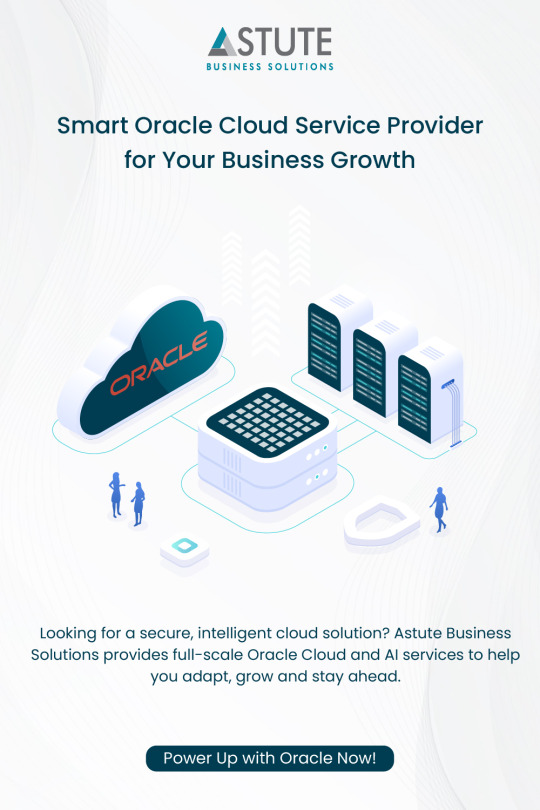
From AI implementation to disaster recovery and scalable OCVS solutions—As a leading Oracle service provider, Astute Business Solutions helps businesses succeed with Oracle Cloud. Achieve performance, security, and innovation with our expert team. Boost Business Agility Today!
#oracle cloud services#ai business solutions#digital transformation tools#cloud infrastructure strategy#enterprise technology growth
0 notes
Text

Virtual Infra delivers secure, scalable AI, Cloud, and Digital Transformation solutions tailored to enterprise needs. https://www.virtual-infra.com/
#AI solutions#cloud computing services#digital transformation#enterprise IT#data analytics#DevOps#cybersecurity#AI infrastructure
0 notes
Text
Enterprise AI & Cloud Solutions | Virtual Infra
Virtual Infra delivers secure, scalable AI, Cloud, and Digital Transformation solutions tailored to enterprise needs.
Discover Virtual Infra’s AI-driven cloud solutions and enterprise-grade IT services that accelerate digital transformation, automation, and data security.

#AI solutions#cloud computing services#digital transformation#enterprise IT#data analytics#DevOps#cybersecurity#AI infrastructure
0 notes